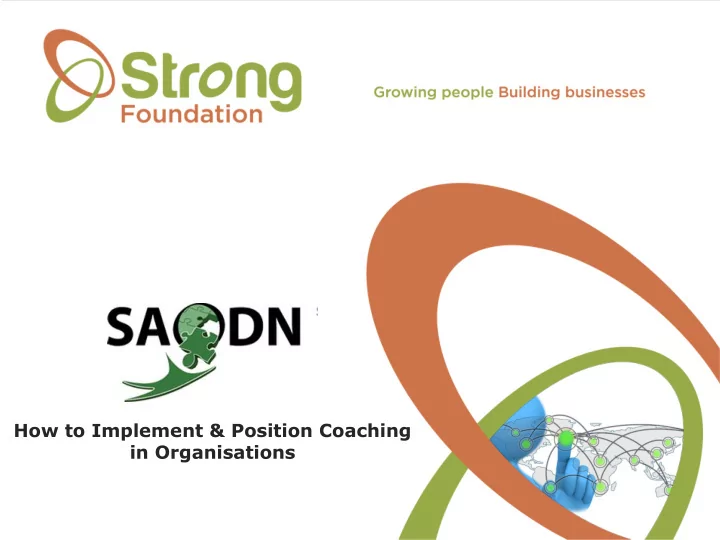

How to Implement & Position Coaching in Organisations
Thank you for making me feel
What would you like to walk away with?
What I would like to share USP’s of Coaching Using Coaching in Organisations Implementing Coaching ROI & Supervision
How would you sell Leadership Coaching?
Who buys coaching and why? • Who? – Senior leaders and Top Line executives (Sherpa 2013) • Why? – Focus & Goal achievement – Accountability – Challenge & support – Soundboard & objectivity – Awareness – Clarity – Unavoidable reality of development
How would you sell Performance Coaching?
Coaching “You might be on the right track, but if you just sit there you’ll get run over.” Will Rogers (US Humorist and actor 1879-1935)
A hard sell… • It’s not a product • It’s a service – Relationship – Word of mouth – Experience – Results
Before selling coaching • Learn about the Organisation: – What immediate need do they have for coaching? – What is currently going on in the organisation? – What results do they expect coaching to have? – What level of leaders will be coached? – Have they experienced coaching before? – What other development was/is/or will be done? – Who else will be involved in the process? – Organisational structure? Culture? Leadership style? – Do the leaders have assessments of self? 360’s? – What about feedback? Confidentiality?
What are your thoughts on the benefits of coaching?
Feedback • Increased awareness • Clarity of thinking • Better self management • Work life balance • Increased productivity • Greater confidence • Better decision making • Better leadership • Clarity in communication • Increased motivation & resiliency
Summary • Great coaching and unrealistic expectation will fail • Great coaching in the wrong context will fail • Coaching must be actively managed • Match the expectation and the need to the coach and you have a winning combination!
Why coach in organisations
Basic Coaching is Coaching • Interventions differ based on – Context – Purpose – Skills & abilities of Coach – Tools & assessments used – Flow of the intervention – Directive or non-directive balance
How could you use Coaching in business?
Feedback Leadership development coaching • Executive coaching • Leading change coaching • Wellness coaching • Performance improvement coaching • Productivity coaching • Personal development coaching • Onboarding coaching • Fast tracking • Retrenchment coaching • Retirement coaching • EQ coaching • Learning environment coaching • Team coaching •
Reflect and write down • If money, time and buy- in was not an obstacle… – Where in your organisation would Coaching have the biggest impact right now?
What realities would impact interventions in an organisation?
The coach’s place in the system • Ethical dilemma: Who is the client? – Complexity of information carried by the coach – Role clarification for the coach – Confidentiality in reporting
External vs. Internal Coaches
Guidelines for introducing a coaching change programme in organisations
Package Coaching Integration & Context of the organisation Model Present your plan History Philosophy VVMO Contract! Tools Proposal Organogram Deliver Plan Feedback Initiatives Duration Reporting Match Needs Fees Logistics Coach Expectations Outcomes Record Assess Challenges keeping Supervise Admin Report Admin Conclude
Where will Coaching have the biggest impact? What do you want to achieve through coaching? • X X How do you see the coaching process? • What actions need to be taken in order for the process to • happen? Who needs to buy in to the process? • Who else needs to be engaged in the process to support • its success?
A Sample Coaching intervention 1. Intake 2. Goals B u i l d i n g R a p p o r t 3. Agree goal 4. Triad 5. Assess 6. Coach D o i n g t h e W o r k 7. 8. Review 9. 10. Close
Assessment tools for consideration Coaching Readiness • Needs analysis • Personality preference / Individual styles • – SDI; Insights; MBTI; DISC, Thomas Profiles, Lumina, NBI etc… Learning styles • – Honey & Mumford; Kolb Leadership • 360 Assessments; Leadership Mystique – Values • SF Values; Barrett Scale – EQ • BarOn EQ; Hay Group ECI; EQ Map (Essi Systems) – Organisational culture • Team culture •
Measuring the effectiveness of coaching
A few variables influence ROI • Type of intervention • Organisation • Readiness for change • Purpose of coaching
What should be measured • Learning • Behaviour • Change • Bottom-line
Return on investment (ROI) • Earning vs. Investment • So in the context of coaching, the earnings become the net benefits from the programme (monetary benefits minus the costs) divided by the investment (the actual cost of the coaching).
3. Benefit calculation Indicator Estimated Percentage Percentage Value of impact annual improvement confidence in monetary due this estimate value to coaching of performance improvement Increased R235 000 50% 75% R88 125 ability to set motivating sales targets for team Reduced R30 000 80% 60% R14 400 meeting time Faster R180 000 100% 80% R 144000 resolve on team issues affecting delivery TOTAL R246525
5. ROI final calculation Calculate the fees of the coaching engagement. This needs to include the following: • Professional fees charged • Client’s time to participate in the coaching sessions • Costs of material used (meeting rooms, assessment tools) • Travel expenses • Admin costs
Formula • ROI: ((Benefits – Costs)/Cost) x 100 • ( R246525-80 000) / 80 000)x100 = 208.15%
Supervision ‘Every Coach, needs a coach’
Discussion time • Let’s look at the question box
Check out • What did you find most useful? www.strongfoundation.co.za
Recommend
More recommend